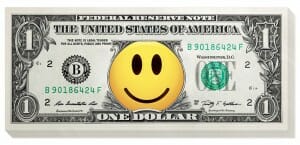Get Happy
As sleepy students filter in for an 8:50 a.m. class, UW consumer science clinical professor Christine Whelan scans a playlist on her laptop in search of a song. She settles on the soul classic “Lovely Day” by Bill Withers, and lets it play before beginning her morning lecture in the School of Human Ecology building.
“It’s not even 9 a.m., and we’re going to talk about obituaries,” she says, before eventually challenging students to write their own.
It might feel like a stark shift in mood, but the task is typical of the self-examination required in Consuming Happiness — more informally known as “the happy class” — which focuses on the relationship between well-being and money.
“The argument we are making in this course is, yes, you can buy happiness — if you spend your money right,” Whelan says.
How we spend our money is a window into our values, but the two don’t always match up. To illustrate, Whelan proposes students play what she calls an “evil” game: paper clip a note listing their values to their credit or debit cards, which they must confront every time they pull them out to buy something.
The course also draws on social science research on spending that reveals some key principles for how to spend your way to happiness. A big one is buying experiences, such as travel or concerts, which brings more satisfaction than buying stuff. “When we tell our story, who we are, we talk about our experiences,” Whelan says. Another strategy is to “make it a treat,” which means you’ll savor that morning latte much more if you buy one a week rather than one every morning. Research also suggests the benefits of delayed gratification: paying for something, such as a trip, upfront to separate the pain of its cost from the pleasure of enjoying it.
Finding purpose is another key course theme. “If you achieve a goal without having a purpose, it is empty,” Whelan says. Happiness — and a meaningful life — come from using our natural gifts to live out our values and help others. To explore that idea, she touches on philosophies rooted in sources ranging from Christianity to Confucianism (the class is cross-listed with religious studies) and digs into scientific research. Studies have shown that people who live with purpose are healthier and make $10,000 to $15,000 more a year, Whelan says.
“Consuming happiness is a path to figuring out what you care about, what matters,” Whelan says.
The course also examines the $12 billion self-improvement industry, with a reading list that includes self-help titles such as The Power of Positive Thinking and The Secret, as well as academic critiques of the theories they espouse. Students even follow some of the books’ advice to determine whether it can work in their own lives. One observation a student shared during the final day of the class: “The Secret is a joke.”
But there are more fruitful takeaways, too, such as this one: “Happiness won’t just come to you; you have to work for it.”
Published in the Spring 2018 issue



Comments
No comments posted yet.